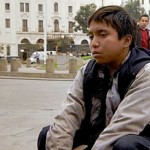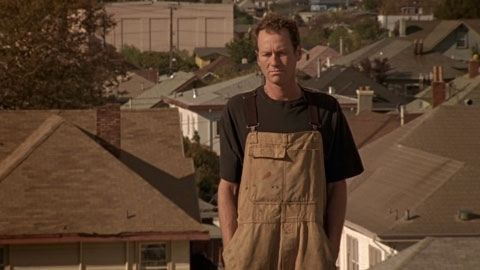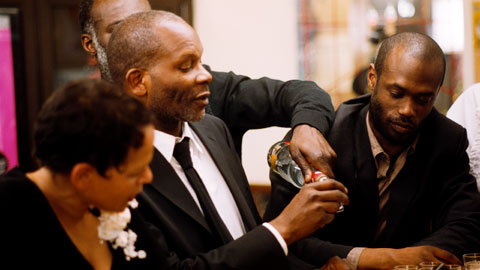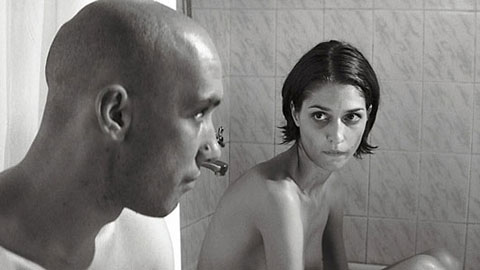Oblivion (Heddy Honigmann)
Four years ago, on my first trip to the San Francisco International Film Festival, a couple friends and I had our liveliest debate after a screening of Ellen Perry’s The Fall of Fujimori, a documentary about Peru’s recent political history told mostly in the first person by Fujimori himself. On one side of the debate were those of us who felt the strength of the film was its subtle ironies, particularly its use of the contemporary context (the early days of Bush’s war on terror) to undermine the elected dictator’s self-aggrandizing justifications of his anti-democratic domestic policies. On the other side were those who argued that people in power are afforded ample opportunity to speak for themselves and that the filmmaker was morally obligated to condemn Fujimori outright. It was a fun — and heated — exchange. Heddy Honigmann’s latest film is a fascinating answer to that discussion. Oblivion is also told in the first person, though this time mostly by aging, blue-collar workers who, in several cases, literally served (whether food or drink or services) several past presidents and dictators, including Fujimori. I’ve only seen two Honigmann films, but in both I’ve been startled by the candor she elicits from her interview subjects. Here, her camera lingers awkwardly on a man who admits with some shame that after working for more than 30 years in one of Lima’s finest restaurants, he had never had an opportunity to take his wife there. A 60-year-old leather worker hides his face when he’s overcome by emotion while remembering all he lost during the days of runaway inflation. An adolescent shoeshine boy stares blankly into the camera and tells Honigmann, “No, I don’t have any dreams. No, I don’t have any happy memories.” She intercuts these stories with footage of young, self-taught jugglers and acrobats — homeless kids — who perform in busy intersections during red lights. They’re graceful and full of life, their performances have a startling and kinetic beauty. The juxtaposition is complex and loaded with ambiguities — a reflection, I suspect, of Honigmann’s personal relationship with her home country.
Everything Strange and New (Frazer Bradshaw)
To recycle a line I’ve used before, I’m often more interested in what a film does than what it’s about, and Bradshaw’s first narrative feature, Everything Strange and New, does quite a lot. The opening shot (pictured above) is a long, static take accompanied by an explosion of percussive, dissonant music — a self-conscious announcement that this is not another of those suburban stories about disaffected fathers and husbands. As it turns out, it is one of those films, but I’ll credit Bradshaw for his experiments with the genre, particularly his working-class lead character, Wayne, and for his often fascinating photography. One or two shots approach Bela Tarr territory (if Tarr shot a low-budget dv movie). Had the film ended 20 minutes sooner, I would have even applauded Bradshaw’s success at blending avant-garde techniques with more naturalistic storytelling. But a plot turn in the final act — and, more importantly, Bradshaw’s cynical handling of it — caused me to reevaluate everything that came before. Everything Strange and New is cruel to its characters in a way that comes off as smug rather than searching.
35 Shots of Rum (Claire Denis)
I’ve already written a bit about this film, but I want to quickly mention a scene that, to me, encapsulates all that distinguishes Denis’s take on the small, family drama from most other films in the genre. The morning after the “Nightshift,” Noé (Grégoire Colin) announces to Gabrielle (Nicole Dogué) and Joséphine (Mati Diop) that he’s leaving for a job in Gabon. Rather than dealing explicitly with the fallout from his decision, Denis cuts, instead, to a closeup of Lionel (Alex Descas), who’s walking home, presumably after a one-night-stand. She then cuts on an eyeline match to Joséphine climbing precariously out of their top-story window with a bottle of cleaner and towels in her hand. We are given, cinematically, the perspective of a father watching his child in danger. Or, at least that’s how I read the image the first time. On repeat viewings, there’s something much more interesting in Lionel’s expression: his intimate and hard-won understanding of his daughter’s behavior, his realization that she’s cleaning, which means that she’s upset, which means that it’s his job to go soothe and protect her. This plays out in the next few minutes in a wonderful scene in which their history is revealed through gestures. There’s text — Joséphine shaking out the bedsheets, looking through family photos, and arguing with her father — and there’s subtext — not only the loss of their mother/wife but also their deep familiarity with each other and with moments like this. (We can immediately imagine them having a hundred other similar confrontations — her cleaning, him stoic, with arms folded.) Characters in movies expertly express their feelings; real people, in my experience, typically don’t. Yet those of us in successful, long-term relationships manage to communicate anyway. 35 Shots of Rum is rare for managing to capture that peculiar kind of intimacy on screen. Ozu would approve.
Zift (Javor Gardev)
A Bulgarian film noir? Yes, please. Although a bit too stylized (in the Tarantino sense) for my tastes, Zift is a hell of a lot of fun and could probably find a decent audience in the States if a distributor packaged it properly. (First-time director Gardev must surely be taking studio offers for his next film as we speak.) The movie borrows liberally from classic Hollywood noirs, most notably a reenactment of Rita Hayworth’s iconic number in Gilda, and the black-and-white cinematography honors that legacy while updating the camera movements for contemporary audiences accustomed to a more frenetic pace. The two lead actors are fun discoveries, too, particularly Tanya Ilieva, who, frankly, is one of the sexiest women I’ve ever seen on screen. Zift was on my radar last September at TIFF, so I’m glad to have finally had a chance to catch up with it.
Wild Field (Mikheil Kalatozishvili)
Wild Field belongs to a class of films I’m drawn to at festivals. I rarely expect them to be great (and they rarely are), but I see them less for their stories or formal innovations than for the opportunity they provide to watch people in a part of the world I would never have a chance to see otherwise. (Tulpan is another recent example.) Wild Field is set in a remote region of the Kazakh steppes, where a young doctor lives Thoreau-like, tends to a handful of locals, and pines for his girlfriend back in civilization. Although I can’t find confirmation for this, I suspect this is an adaptation of a novel. I can imagine the protagonist’s inner life being a playhouse of ideas for a gifted writer, and the moments of magical realism that pockmark the film could flower beautifully in prose, but Kalatozishvili fails to find a cinematographic analogue, and the pacing of the film suffers for it. Still, I was perfectly content to study the landscape and faces for 90 minutes or so.





Comments
3 responses to “2009 SFIFF Diary 2”
I thought I read somewhere that Zift had picked up a NA distributor but I can’t remember whom. I’ve missed it several times (TIFF, Reykjavik) but it sounds like fun.
Wild Field is not an adaptation of a novel; however the screenwriting duo of this film was one of the best creative forces of the perestroika aftermath. Sadly, the screenwriters are both dead now, and the screenplay is like 10 years old.
Thanks for the clarification, Marusja.